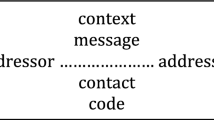Abstract
This article discusses deontic modality in the context of legal documents and its divergence from the natural, conventional, interpretation. This work demonstrates that the meaning of the performative verb is not purely linguistic. A number of non-linguistic factors cause the variation of meanings of performatives, in this case, when expressing prohibition, permission, recommendation, advice, proposal or request. These factors include: status of the addressee, type of the relationship between the author and the addressee, type of the document, possibility of control and subsequent punishment for the breach of a norm, methodology of legal drafting, traditions of the Russian document processes. There is no direct association between the type of the legal norm (permissive, obligatory, prohibitive) and the meaning of the performative. To express its will, a regional law-maker, to a varying degree, uses orders, prohibition and permissions. These are dictated by the type of the document.
Similar content being viewed by others
References
Alekseev, Sergey S., and Sergey I. Arkhipov. 2005. Theory of a state and law, 496. Moscow: Norma.
Apresyan, Yuri D. 1995. Performatives in a grammar and vocabulary. Selected works. Vol. II, 199–218. Moscow: Shkola “Yazyki russkoy kul’tury”.
Austin, John L. 1962. How to do things with words. Oxford: Clarendon Press.
Bally, Charles. 1944. Linguistique générale et linguistique française. Paris: P.U.F.
Baranov, Anatoly G. 1993. Functional-pragmatic concept of a text, 182. Rostov-on-Don: Izd-vo Rost. un-ta.
Belyaeva, Elena. I. 1990. Possibility. Theory of functional grammar: Temporality. Modality. Leningrad: «Nauka. Leningradskoye otdeleniye» publ.
Benveniste, Émile. 1966. Problèmes de linguistique générale. Paris: Gallimard, coll. «Bibliothèque des sciences humaines».
Davydova, Marina L. 2009. A legal technique: Problems of theory and methodology. Monograph. Volgograd: Izdatel’stvo Volgogradskogo GU.
Fetyukhin, Michael I. 1999. Manifestation of necessity function in a text of criminal procedural law: Ethic and pedagogical bases of optimization of a lawyer’s service communication: Training and methodological manual. Volgograd: Izd-vo VolGU.
Feys Robert. Modal logics. Edited with some complements by Dopp Joseph. Collection de logique mathématique, Série B no. 4. E. Nauwelaerts, Louvain, and Gauthier-Villars, Paris, 1965, XIV+.
Fitch, Frederic B. 1952. Symbolic logic. N.Y.: Ronald Press.
Foley, William A., Van Valin, and D. Robert. 1984. Functional syntax and universal grammar. Cambridge: Cambridge University Press.
Galperin, Ilya R. 1981. Text as an object of linguistic research, 138. Moscow: Nauka.
Golev, Nikolay D. (ed.). 1999. Legal aspect of language in linguistic coverage. In Yurislingvistika-1. Barnaul: Problems and prospects.
Grebnyova, Ol’ga V. 2004. Modality of necessity in legislative texts of the European Union: On material of the German and English languages (DPhil thesis, Kazan).
Ivin, Alexander A. 1973. Logics of norms. Moscow: Moscow State University.
Kashanina, Tatiana V. 2011. A legal technique: Textbook. Moscow: Norma: INFRA-M.
Kasimov, Timur S. 2008. A legal technique: Training and metodological complex. Ufa: BAGSU.
Kobozeva, Irina M. 1986. Theory of speech acts as one of the versions of theory of speech activity. In: New in foreign linguistics, ed. Gorodetsky, Yu B. Issue 17. Moscow: Progress M.
Kovkel’, Natalia F. 2007 Expression of deontic modalities in texts of normative legal acts. In Problems of development of transitive economics: Innovativeness, resistance, globalization: Proceedings of International Scientific-Practice Conference Minsk, May 22–23 2007 Minsk.
Krasina, Elena A. 1999. Semantics and pragmatics of Russian performative utterances. (DPhil thesis, Moscow).
Krasnov, Yuri K. 2014. A legal technique: Textbook. Moscow: Yustitsinform.
Krasnukhin, Constantine G. 2000. Grammatical expression of necessity in the most ancient Indo-European legislative texts. In Logical analysis of language: Languages of ethics, eds. N.D. Arutyunova, T.E. Yanko, N.K. Ryabtseva. Moscow: A. Koshelev.
Le Querler, Nicole. 1996. Typologie des modalités. Caen: Presses Universitair de Caen.
Mal’ko, Aleksandr V. (ed.). 2014. Legal technique: Reference book. Moscow: Direkt-Media.
Lyons, John. 1977. Semantics, vol. 1–2. Cambridge: Cambridge University Press.
Maslova, Alina Yu. 2001. On specificity of expression of prohibition (on material of the Russian and Serbian languages). In Vladimir Dal and modern philology: Proceedings of the international academic conference. November 22–23, 2001. Nizhny Novgorod, Vol. 1. Nizhny Novgorod: NGLU im. N.A. Dobrolyubova.
Orlova, Natal’ya V. 2014. Modality and tonality of modern documents with a prescribing function. Herald of Omsk University. No. 4 (74).
Paducheva, Elena V. 2014. Modality. Materials for a project of a corps description of the Russian grammar (http://rusgram.ru). Manuscript. Moscow.
Palmer, Frank R. 2001. Mood and modality. Cambridge: Cambridge University Press.
Panfilov, Vladimir Z. 1982. Epistemological aspects of philosophical problems of linguistics. Moscow: M. Nauka.
Plungyan, Vladimir A. 2011. Introduction to grammatical semantics: Grammatical meanings and grammatical systems of world languages. Moscow: RGGU. Плyнгян.
Quine, W. Van O. 1953. From a logical point of view: 9 Logico-Philosophical Essays. In Reference and modality. Cambridge, Mass: Harvard University Press.
Searle, John R. 1969. Speech acts. Cambridge: Cambridge University Press.
Searle, John Rogers. 1986. Classification of illocutionary acts. In New in foreign linguistics, ed. Gorodetskiy, Yu B. Issue 17. Moscow.
Shapovalov, Ivan A. 2013. Problem of rationality in legal argumentation of court decisions. In A legal technique. No. 7-1.
Shirinkina, Maria A. 2010. On some parameters of an interpretative discourse in sphere of law. In Yurislingvistika-10. Linguistic conflictology and law: interuniversity collection of scientific papers. Kemerovo; Barnaul: Izd-vo Alt. un-ta.
Stepanov, Yuri S. 1981. Names, predicates, sentences. Moscow: Semiological grammar.
Tseytlin, Stella N. 1990. Necessity. In Theory of functional grammar: Temporality. Modality, ed. A.V. Bondarenko. Leningrad: «Nauka. Leningradskoye otdeleniye».
Turayeva, Zinaida Ya. 1994. Text linguistics and a category of modality. VYa No. 3. P. 105–114.
Vaulina, Svetlana S., Magdalinskaya, Ekaterina N. 2012. Modal microfield of necessity in official-commercial documents of the Russian and Polish languages. Vestnik. No. 8
Vinogradov, Victor V. 1975. On the category of modality and modal words in Russian. In Studies on the Russian grammar: Selected works, ed. Shvedova, Yu N. Moscow: Nauka.
Volf, Elena M. 2002. Functional semantics of evaluation. Moscow: Editoreal URSS.
Author information
Authors and Affiliations
Corresponding author
Rights and permissions
About this article
Cite this article
Kireeva, E.Z. Modality of Obligation as a Legal Phenomenon (in the Context of Regional Legislation). Int J Semiot Law 30, 129–150 (2017). https://doi.org/10.1007/s11196-016-9485-6
Published:
Issue Date:
DOI: https://doi.org/10.1007/s11196-016-9485-6




